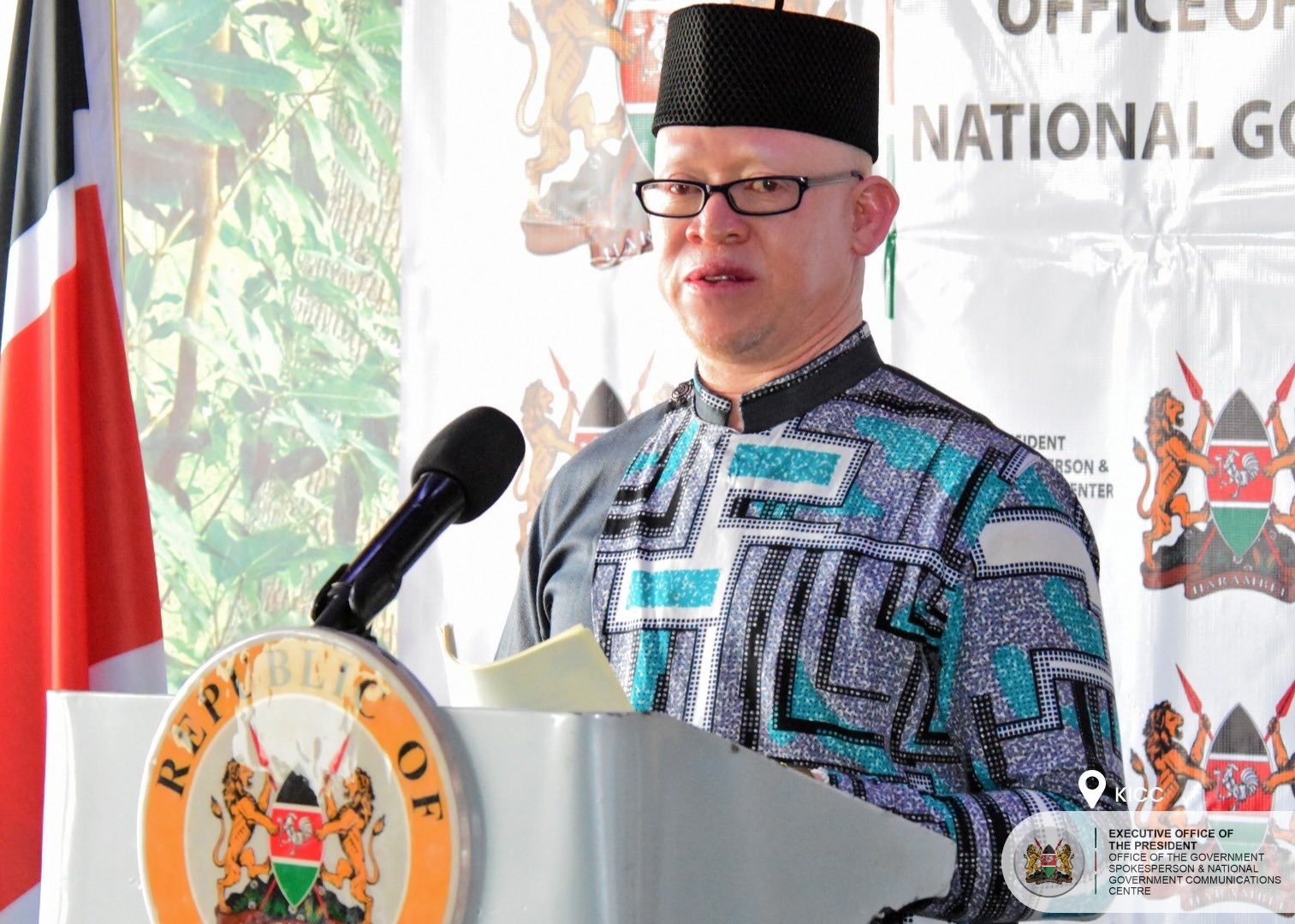Opinion
The Isaac Mwaura Communication Debacle: A Masterclass in Professional Incompetence
His credibility is so severely compromised that his continued tenure damages the administration’s ability to communicate effectively with the public.

An Analysis of Government Communication Failures and the Price of Public Trust
In the annals of government communication disasters, Isaac Mwaura’s three-day spectacle regarding the Public Seal will undoubtedly secure its place as a textbook example of how not to serve as a government spokesperson. What unfolded between Monday and Wednesday this week was not merely a simple mistake or miscommunication—it was a systematic demonstration of professional incompetence that raises fundamental questions about the standards we accept from our public servants.
The anatomy of a communication catastrophe
Government spokespersons carry a singular responsibility: to accurately and clearly convey official positions to the public.
This role demands precision, preparation, and above all, credibility. Mwaura’s performance this week violated every principle of effective government communication with a brazenness that borders on the absurd.
On Monday, with the confidence of someone announcing the weather, Mwaura declared that the Public Seal had been transferred from the Attorney General to the Head of Public Service, citing compliance with “the law.”
When pressed for details about this mysterious legislation, his responses devolved into vague references to “sometime last year” and uncertain mutterings about public participation.
For a government spokesman to make categorical legal declarations without basic knowledge of the legislative framework is not just embarrassing—it’s a dereliction of duty.
The irony deepened when Mwaura chose to elaborate, painting the Head of Public Service as some sort of administrative superhero who “executes the President’s directives, manages daily government operations, and tackles corruption.”
This theatrical embellishment revealed either a profound misunderstanding of government structure or a troubling tendency toward hyperbolic nonsense when faced with legitimate scrutiny.
The art of the complete reversal
What followed two days later was perhaps even more damaging: a complete 180-degree reversal that obliterated any remaining credibility.
Suddenly, the “new law” vanished into thin air.
The confident assertions about executive clarity evaporated. Instead, Mwaura retreated to citing the Office of the Attorney General Act and the Constitution—documents that had presumably not changed since Monday’s confident proclamations.
This wasn’t a minor clarification or adjustment based on new information.
This was a wholesale abandonment of an official position that had been stated with absolute certainty just 48 hours earlier. In the world of government communication, such reversals don’t just undermine the spokesperson—they erode public trust in the entire administration’s competence and reliability.
The ultimate insult: Blaming the messenger
Perhaps the most egregious aspect of this entire debacle was Mwaura’s decision to blame the media for the confusion he created.
This represents the absolute nadir of professional responsibility.
Rather than acknowledging his role in disseminating contradictory information, he had the audacity to lecture media houses about fact-verification while simultaneously demonstrating his own complete failure to verify the most basic facts about his own government’s positions.
“We want to tell media houses to verify their facts before they publish,” he declared, apparently oblivious to the rich irony of a government official who had just spent three days broadcasting unverified information now lecturing journalists about accuracy.
This level of tone-deafness suggests either remarkable self-delusion or a cynical calculation that the public won’t notice the contradiction.
The professional standards crisis
Mwaura’s performance shows a broader crisis in professional standards within government communication.
The role of government spokesperson requires several fundamental competencies that were conspicuously absent this week:
Preparation and Knowledge: A spokesperson must possess thorough knowledge of government positions before making public statements. Mwaura’s vague references to laws he couldn’t identify or date demonstrate a failure to meet this basic requirement.
Consistency: Government positions should remain stable unless there are legitimate reasons for change, which should be clearly explained. Mwaura’s contradictory statements within a three-day period suggest either internal governmental chaos or personal incompetence—neither is acceptable.
Accountability: When mistakes occur, professional integrity demands acknowledgment and correction. Mwaura’s decision to blame external parties for his own errors represents a fundamental failure of professional character.
Credibility Management: A spokesperson’s primary asset is credibility. Once lost, it cannot be easily restored. Mwaura’s cavalier approach to factual accuracy has severely compromised his ability to serve effectively in his role.
The institutional damage
The implications of this communication failure extend far beyond Mwaura’s personal competence. Government credibility operates on the principle that official statements reflect verified positions. When that principle is violated as dramatically as it was this week, several damaging consequences follow:
Citizens lose confidence in official communications, creating a information vacuum filled by speculation and rumor. Policy implementation becomes more difficult when the public questions the reliability of government pronouncements. International observers note the inconsistency and factor it into their assessments of governmental stability and competence.
Perhaps most concerning, such failures normalize incompetence, creating an environment where substandard performance becomes acceptable. This sets a dangerous precedent that undermines professional standards across the entire government communication apparatus.
The solution to this communication crisis requires both immediate action and systemic reform. Mwaura’s position as government spokesperson has become untenable.
His credibility is so severely compromised that his continued tenure damages the administration’s ability to communicate effectively with the public.
However, replacing Mwaura alone is insufficient. This incident reveals deeper problems in how government communications are managed, verified, and coordinated.
Systematic reforms are needed to establish clear protocols for information verification, consistent messaging across government departments, and accountability mechanisms for communication failures.
The price of incompetence
Isaac Mwaura’s three-day communication disaster represents more than personal failure—it exemplifies the corrosive effect of accepting substandard performance in critical government roles.
The casual relationship with facts, the contradictory messaging, and the refusal to accept responsibility all point to a professional culture that prioritizes political expediency over competent governance.
The citizens of Kenya deserve better.
They deserve government spokespersons who understand their role, prepare thoroughly, communicate clearly, and accept responsibility for their mistakes. They deserve officials who treat public trust as the precious commodity it is, rather than something to be squandered through careless incompetence.
Mwaura’s tenure as government spokesperson has become a liability to effective governance.
His continued presence in this role serves as a daily reminder that mediocrity has been normalized at the highest levels of government communication.
The administration must decide whether it values competent governance or is content with this embarrassing standard of professional performance.
The public is watching, and they deserve an answer that goes beyond blame-shifting and excuse-making. They deserve competence, consistency, and credibility from their government spokespersons.
Until that standard is restored, incidents like this week’s debacle will continue to erode the foundation of public trust that effective governance requires.
The choice is clear: maintain professional standards or accept the consequences of continued institutional deterioration.
Isaac Mwaura’s performance this week has forced this decision.
The administration’s response will reveal whether it is serious about competent governance or content with the continued normalization of professional incompetence.
Kenya Insights allows guest blogging, if you want to be published on Kenya’s most authoritative and accurate blog, have an expose, news TIPS, story angles, human interest stories, drop us an email on [email protected] or via Telegram
-

 Business1 week ago
Business1 week agobetPawa Empire Crumbles: Mr Eazi’s Betting Gambit Unravels Amid Partner’s Shadowy Deals
-

 Business7 days ago
Business7 days agoMinnesota Fraud, Rice Saga, Medical Equipment Deal: Why BBS Mall Owner Abdiweli Hassan is Becoming The Face of Controversial Somali Businessman in Nairobi
-

 News1 week ago
News1 week agoDCI Probes Meridian Equator Hospital After Botched Procedure That Killed a Lawyer
-

 Politics7 days ago
Politics7 days agoYour Excellency! How Ida’s New Job Title From Ruto’s Envoy Job Is Likely to Impact Luo Politics Post Raila
-

 Business2 weeks ago
Business2 weeks agoKRA Boss Humphrey Watanga In Big Trouble In Sh5.5 Billion Rice Import Scandal
-

 Investigations2 weeks ago
Investigations2 weeks agoEXPOSED: SHA Officials Approve Higher Payments for Family, Friends as Poor Patients Pay Out of Pocket
-

 News7 days ago
News7 days agoKenya Stares At Health Catastrophe As US Abandons WHO, Threatens Billions In Disease Fighting Programmes
-

 Business1 week ago
Business1 week agoState Set to Demolish Pastor Ng’ang’a’s Church in Sh28 Billion Railway City Push



















